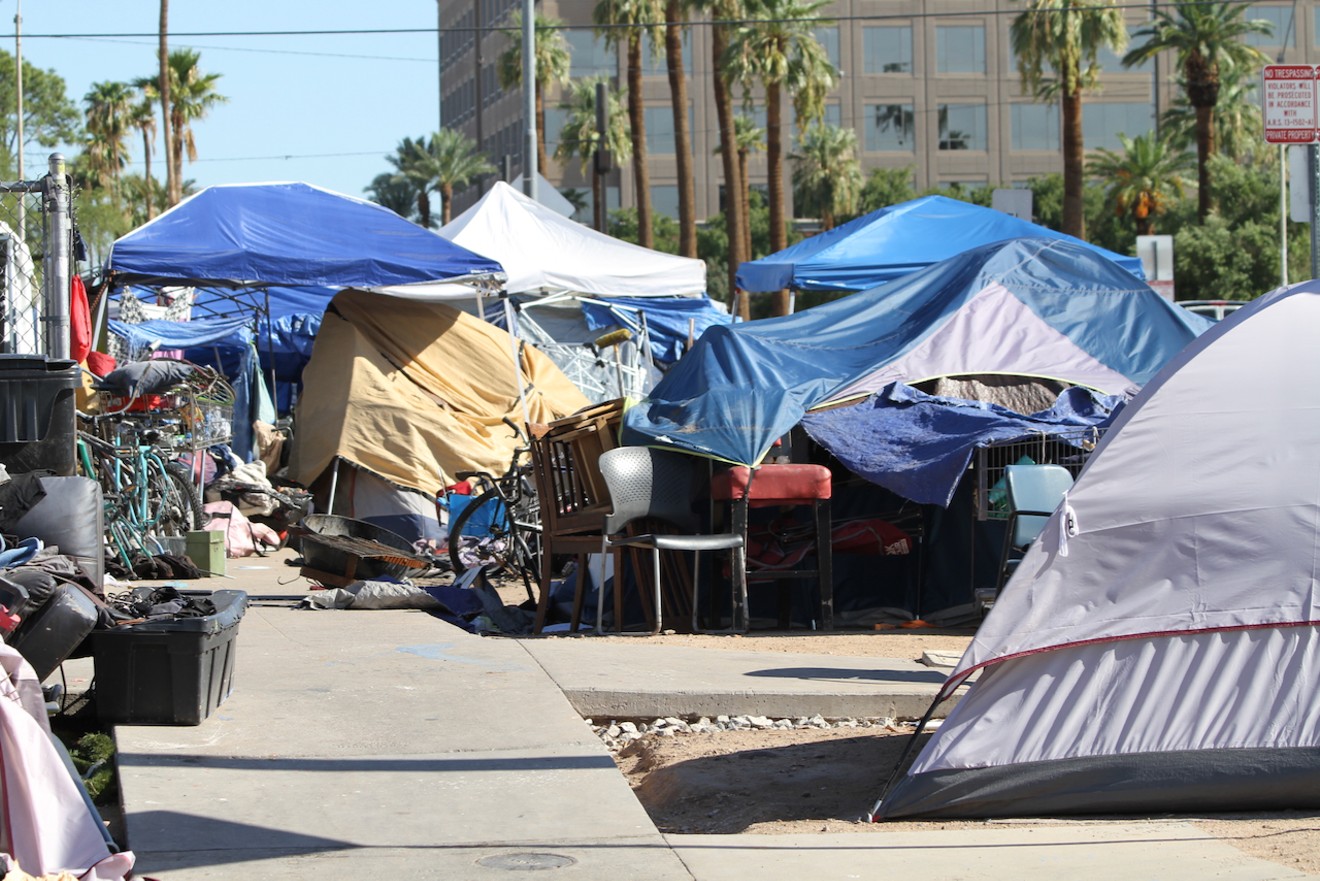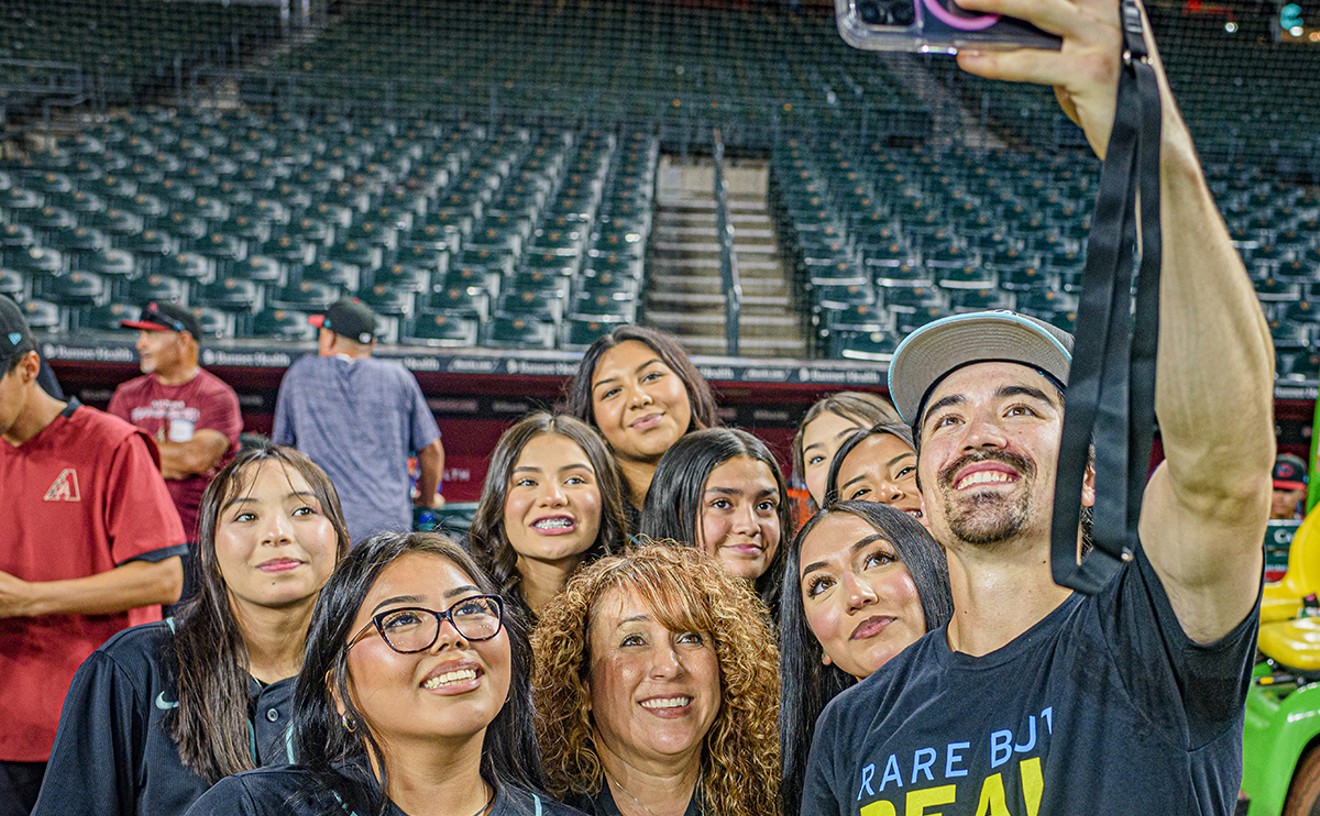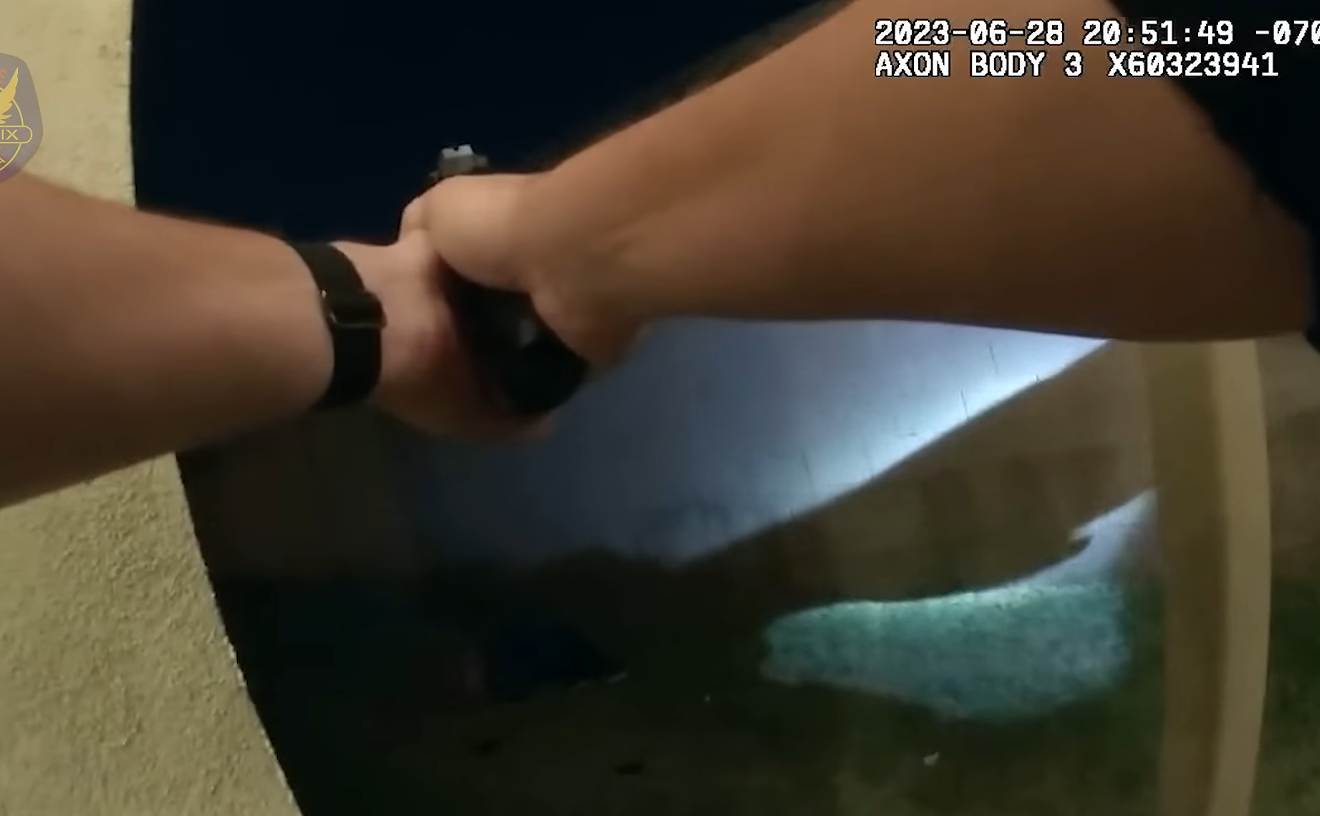Attorneys for the city of Phoenix and for a group of downtown property owners who live in the middle of the city’s largest encampment of unsheltered people — often called "the Zone" — filed into the Maricopa County Superior Court for a day-long hearing on Thursday.
It was the latest face-off in court over the encampment, prompted by a lawsuit from property owners who are attempting to push the city into action.
Missing from the hearing, though, were the more than 1,000 people who now live semipermanently on the streets of the Zone. What happens to them — and the neighborhood — is now in the hands of Superior Court Judge Alison Bachus, who could respond by ordering the city to clear the encampment, as the property owners want, or throw the case out of court, as the city has requested.
“We are not asking you, your honor, to solve this crisis,” Ilan Wurman, an attorney for the plaintiffs and a professor at Arizona State University, told the judge in his opening remarks on October 27.
“Good,” Bachus replied softly.
“What we are asking you to do is to tell the city what it can’t do. And what it can’t do is violate the law,” Wurman continued. “They don’t get to choose to violate the law. That’s not a choice.”
The legal battle began in August, when 15 people who own homes or businesses in the area between 9th and 13 avenues, south of Jefferson Street and north of Grant Street, filed suit. They alleged that conditions in the neighborhood had deteriorated to such a degree that the city of Phoenix was breaking the law. They requested a judge intervene.
Over the course of the hearing on October 27, the city and the property owners made their case to Bachus. The plaintiffs testified about conditions in the Zone, and their attorneys argued that the city had created a public nuisance and must do something to fix it — whether displacing people and moving them elsewhere or beefing up enforcement.
The city, meanwhile, made the case that it is putting resources toward homelessness — and fixing issues in the Zone — and that a judge could not force the city to change its policy simply because the property and business owners were aggrieved by it.
People have slept on the streets in this area of downtown for decades, though their numbers have increased significantly in recent years. There are multiple homelessness service providers located in the area, including the Human Services Campus, which operates a shelter, and Andre House, which provides meals and other services.
But now, unlike in the past, tents and other structures line the streets, even through the Valley's scorching summers. The conditions are grueling: a single spigot, installed by the city last year, provides the sole source of potable water. The restroom facilities are meager.
Despite the influx of federal funding that Phoenix has received to address homelessness, and despite plenty of lip service to the issue, the city has struggled to provide a path to housing for many people on the streets. The number of shelter beds available in Phoenix has decreased since 2015, dropping from 3,624 to 3,219, according to testimony during the court hearing.
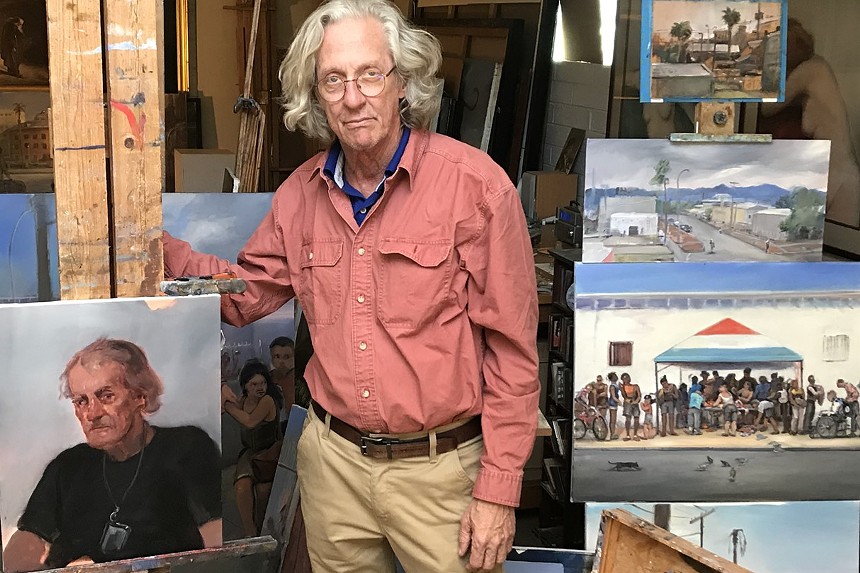
Joel Coplin, who owns a gallery in the Zone, is one of the plaintiffs in a lawsuit against the city of Phoenix over the Zone.
Lynn Trimble
'We Are Talking About People'
Represented by Wurman and Michael Bailey, a former U.S. Attorney in Arizona, the property owners argued that the conditions in their neighborhood constitute a “public nuisance” under the law, which the city is obliged to correct.It is the city’s own policy, Wurman argued, that has created the conditions of the Zone, including biohazards on the streets, obstructions in roadways, and frequent property crimes. Because it's illegal to maintain the conditions, the courts must step in and force the city to take action, the attorneys argued.
What that action would look like, though, is less clear.
The city presented a two-pronged defense during the hearing. First, the city argued, the encampment has sprung up on the streets thanks to service providers locating there and not as a result of direct action by the city. The city does not encourage people to sleep there, and it does — at least sometimes — enforce city ordinances in the area, attorneys said.
Second, attorneys argued that Phoenix is taking action on the issue and “attempting to go above and beyond” by building shelters and funding service providers, attorney Aaron Arnson said.
But the problem of homelessness was not the kind of public nuisance that the city could come in and clear out, he added. “We are talking about people, not concrete. People, not a sewer plant,” Arnson said. The city has discretion over what policies it chooses to adopt to fix the issue and that's not a matter for the courts, he added.
Bachus said little during the court hearing, interjecting only occasionally to ask a question, and giving little insight into her own thinking on the issue. The judge has 60 days to issue a ruling in the case, though she indicated a decision will come well before that deadline.
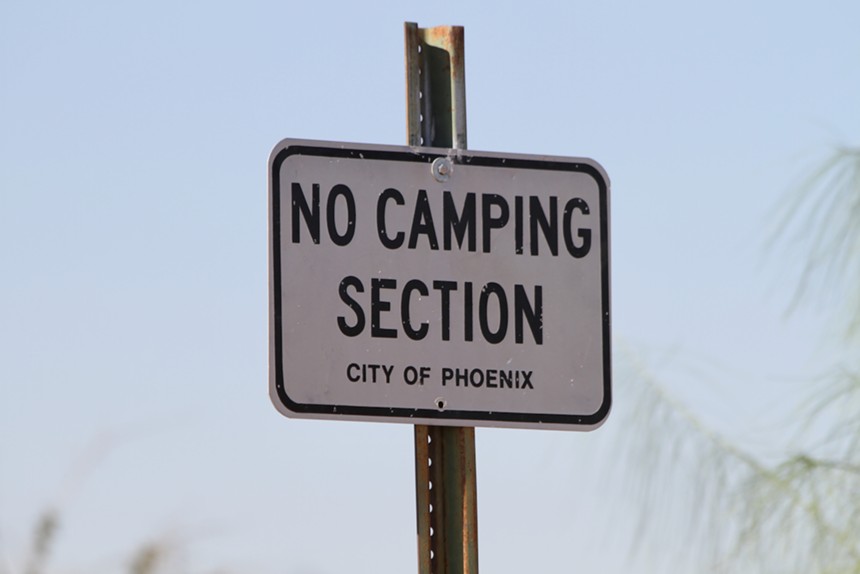
Attorneys on both sides of a lawsuit over a downtown homeless encampment debated the use of structured campgrounds during an October 27 court hearing.
Matt Hennie
'I Don't Feel Safe'
Freddy Brown was the first witness to testify for the property and business owners during the hearing. He owns a casket manufacturing company on Jefferson Street, which his family has operated for decades. “There is waste — human waste, paper waste, trash, everything — being dumped on the streets,” Brown said. “My employees don’t feel safe. I don’t feel safe.”
Brown was followed by Ian Francis Likwarz, who runs a mattress company in the area, and Michael Godbehere, who owns several vacant warehouses on Madison Street. Each walked through the issues that have intensified in their neighborhood over the last three years.
All have experienced vandalism and attempted break-ins. All say that urination and defecation on their properties is frequent and that condoms and drug paraphernalia are left behind, too.
Each said conditions worsened in the Zone in 2019. Before that time, the city enforced its urban camping ordinances, which allowed people to sleep on the streets but not to pitch tents. But in 2018, a decision from the Ninth U.S. Circuit Court of Appeals held that cities could not enforce camping ordinances if no shelter beds were available.
Given the constant shortage of shelter beds in Phoenix, the city is forced to allow public camping. The property owners, though, argued that the city has used the decision in the federal case, Martin v. Boise, as an excuse to stop enforcement of other, unrelated city ordinances in the Zone and abdicated its responsibility of the crisis.
“There are options available to the city, and the city chooses not to take them,” Wurman said. He emphasized that the plaintiffs were not suggesting any particular policy change. Rather, they argued — and hoped for the judge to agree — that the Zone is an illegal public nuisance.
Attorneys for the property owners suggested the city create a structured campground with onsite security and facilities to provide quarters for the unsheltered population in the Zone. During the court hearing, Bailey and Wurman asked city officials why such an option was not considered.
While the neighbors, and some service providers in the area, have endorsed the ideas, structured campgrounds are also controversial. Advocates have noted that relocating people from the Zone to a new location would separate them from vital social services — even though conditions in the area are poor.
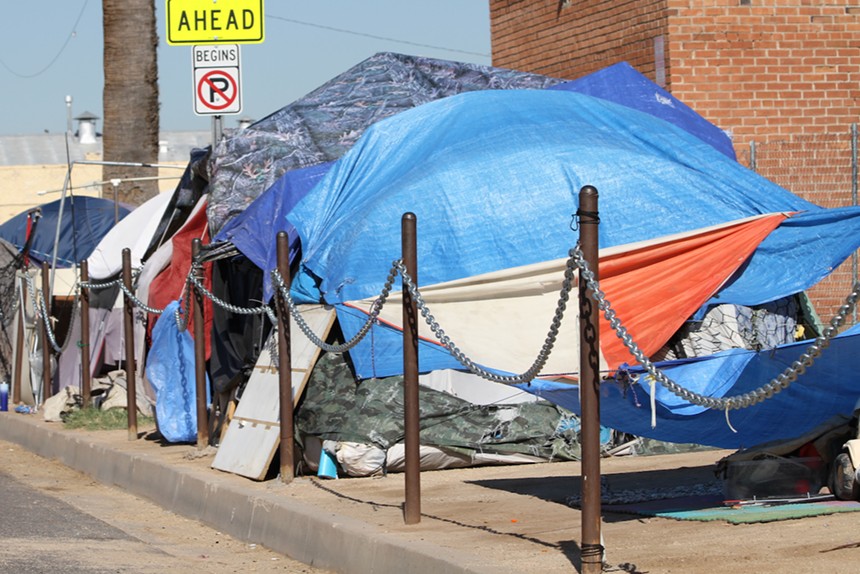
An ongoing lawsuit claims conditions at a downtown encampment for unsheltered people have become "unsanitary and unsafe."
Matt Hennie
City Defends the Zone
Gina Montes, the deputy city manager overseeing housing operations, was the first official called by attorneys for the city. She testified about the millions of dollars Phoenix has funneled toward its housing efforts, and its plans to open additional shelters in the coming months. Then, as Wurman cross-examined Montes with pointed questions, the testimony turned to the idea of a structured campground. Had the city considered such an option?
“We have been prioritizing indoor spaces for people,” Montes explained, noting the dangers of the summer heat.
But Wurman pointed out that despite the city’s priorities, people have continued to live outside on the streets — including through the summers.
Montes, though, wouldn’t budge. The city, she said, was not prioritizing creating a structured campground. Montes later said that while the option had been adopted by other cities, such as Denver, it had not eradicated homelessness.
Arnson repeated this argument in his closing remarks. A structured campground was mostly a solution for the plaintiffs and not the people living on the streets, he said. “We know that heat is an issue. It still wouldn’t get them into a shelter. It still wouldn’t get them into a home. It takes them to a different place that’s not in front of [plaintiffs’] business. But they’re still unsheltered,” Arnson said.
The city also fleshed out its argument that it has taken action to address issues in the Zone. Phoenix Police Commander Brian Freudenthal, who oversees the Central City Precinct, testified that a "shelter squad" of police officers is dedicated to the Zone, which is the smallest geographic area in the city to have such a specialized unit.
Scott Hall, the deputy director for the city’s homelessness services division, explained that the city also conducts regular street cleanings in the Zone.
The city used to conduct more extensive sweeps in the area and force people to move their tents several times a week to conduct cleaning. The cleanups were highly controversial, as the city sometimes confiscated property in the process, and the police department’s role in them is being investigated by the U.S. Department of Justice.
“We paused to make sure we were doing everything safely and appropriately,” Hall said. After people began resisting the sweeps and refused to move their belongings for the cleanups, and activists staged protests, the city was forced to stop them, he added.
But the city has developed new protocols and plans to conduct “enhanced” cleanups starting in December, Hall said.
Attorneys for the property owners, though, emphasized that more urgent action was needed. "Their policy, right now, violates the law," Wurman said in his closing remarks.

